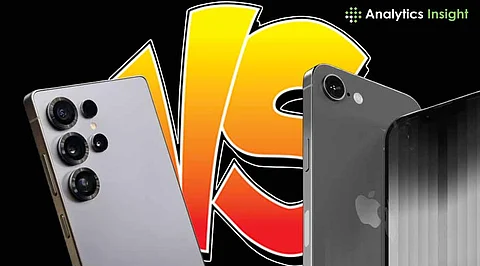

In the war of flagship superiority, Apple and Samsung have again upped the ante with the launch of the iPhone 16 Pro Max and the Galaxy S25 Ultra. The technology giants have unveiled phones that not only set new standards in terms of design and functionality but also define the future of mobile computing. Here is a fact-based comparison of how the two giants match up, and which one merits a place in your pocket.
Apple and Samsung are on the same design page this year, titanium. Both phones boast robust titanium frames, which provide strength without compromising high-end looks. The iPhone 16 Pro Max goes all in on Apple’s minimalist philosophy with flat edges and clean symmetry, while the Galaxy S25 Ultra brings in the softer corners for better ergonomics.
At 227 grams, the iPhone 16 Pro Max is slightly heavier in hand than the Galaxy S25 Ultra’s 218 grams. However, the difference is minimal and will not likely impact user comfort.
Display tech remains a big battleground, and Samsung gets a tiny lead here. The Galaxy S25 Ultra comes with a 6.9-inch Dynamic AMOLED 2X screen, reaching an impressive peak brightness of 2,600 nits and resolution of 3120 x 1440 pixels. It’s a feast for the eyes whether you’re playing games, photo editing, or watching HDR material.
In response, the 6.9-inch Super Retina XDR OLED screen of Apple’s iPhone 16 Pro Max is used. It features a resolution of 2868 x 1320 pixels and peaks at 2,000 nits. Experts and non-experts alike are impressed by Apple’s colour accuracy and variable refresh rate technology, even though it doesn’t exactly equal Samsung’s numbers on paper.
Under the hood is Apple’s most powerful chip to date, the A18 Pro chip, driving the iPhone 16 Pro Max. Based on a 3nm architecture, it features industry-leading single-core performance and energy efficiency, making it a behemoth for AI work, photo editing, and gaming.
Samsung Galaxy S25 Ultra is equipped with the Snapdragon 8 Gen 4 Elite processor supported by 12GB of RAM. Although Apple’s chip is marginally ahead in single-core tests, Samsung leads where multitasking and thermal performance are concerned due to its effective vapor chamber cooling.
Samsung still leads the megapixel stampede, bundling a 200MP primary camera, 50MP ultra-wide, and two telephotos with 5x and 3x optical zoom respectively. Low-light imagery and zoom function are excellent, with AI augmentations refining every shot.
Apple’s strategy is centred around video and realism. The iPhone 16 Pro Max has a 48MP primary sensor, a 48MP ultra-wide, and a 12MP telephoto lens with 5x optical zoom. It might fall behind in sheer pixel count, but it leads in cinematic video recording, stabilisation, and natural colour shades.
Samsung’s 5,000mAh battery edges out the iPhone’s 4,685mAh cell. It also supports 45W fast charging, delivering 65 percent battery in just 30 minutes. Apple, by contrast, offers 25W charging with similar half-hour performance but lower peak efficiency.
India’s first phone made for extreme conditions is the Nokia XR20. It has been tested under fairly extreme conditions and still survives all-around torture-from subterranean to space. Both phones are good enough for a full day of normal to heavy usage. Samsung, however, is better at flexibility-with its much quicker wired or wireless charging options.
Virtual intelligence and a pressure-sensitive capture button are just two of the new telephony functions that Apple’s newly released operating system, iOS 18, features. Seamless ecosystem integration remains a significant selling point, particularly to those deeply invested in the Apple ecosystem.
Samsung’s Galaxy S25 Ultra has Android 15 with One UI 7. The experience is seamless, customizable, and full of features. Samsung is also catching up on Apple’s software support commitment with seven years of major updates.
Both phones are winners in their own right, but your decision should be based on ecosystem loyalty and particular requirements.
Pick the Galaxy S25 Ultra if you prioritise revolutionary camera flexibility, brighter screens, and quicker charging, all for less money.
Pick the iPhone 16 Pro Max if you prefer unparalleled video capabilities, best-in-class chip performance, and cohesive integration within Apple’s ecosystem.
In a year when smartphones have never appeared more similar in design, the true difference is in the software experience and priorities of the user. The crown? That remains dependent on who’s wearing it.
